Km 63,420
When I crossed the border to Serbia I believed that I was in a more developed country; because different from where I was coming the route was new and 50 % wider; for this I felt surer, and due to the tail wind I started to enjoy as few times the cycled. But it lasted just a little, because at the first curve the wind changed and the route became narrow, without its shoulder and plenty of holes; so then everything return to normal. I had to open well my eyes and to pay attention to the trucks to do not come to me close.
Savac was the first city that I crossed; and where I stopped to buy a phone card and to make a call from a public telephone. This, is becoming each time more difficult
That afternoon I bought some fruits that together to some eggs and others were my dinner. I camped before the sunset, in a perfect place, hidden of the route between corn plantations and with a wonderful view to the valley where I contemplated the sunset.
The following day, at the noon I arrived in Belgrade, the capital city.
Belgrade, the capital
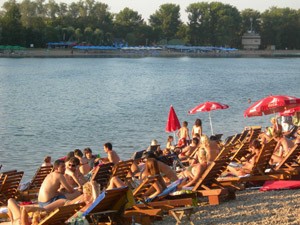
Skirting the Sava River and its beaches I arrive to the capital city, it is Sunday, and its stones beaches are plenty of people, neither that I would have wanted, I would have found a place to take delight. For this, at once I go to Vesna house, an interior designer who I contacted through internet, and who works and lives in a small apartment on the fifth floor in very precarious conditions and with two cats. But even very excited for my place in the new city I carry the whole baggage and the bike, as if it were nothing. But at once that I enter, I become aware how brave I should be to stay in that house during my stay; but I hide it, and I am nice and conversationalist. So Vesna tells me about her life, her work and her trips; I don’t tell her anything about me, because she doesn’t ask me. The house is a total disorder, dirty and everything smell bad; then I take a shower in the bathroom that Vesna shares with her mascots, where there is an unbearable smell. Then I enter in the kitchen and I notice that there is not a kitchen sink, everything is washed in the bathroom. So I understand that in that house it is hardly impossible to cook. Later, because of the bicycle should sleep away of the department I ask to Vesna about the security of the place, and she answers me: “you have two options, or you take your things and you leave, or you stay”. Although I understood that she told it to me joking, I didn’t like, so the following day I took my things, I wrote her a note thanking for her hospitality and I left.
Obviously that, that person who receives me in a city becomes a determining factor to know and to enjoy the place that I visit; and also to understand about the reality of that country. For this reason, because of it was not little what I expected from Belgrade I looked for another lodging option and in this way I arrived at Slobodan house.
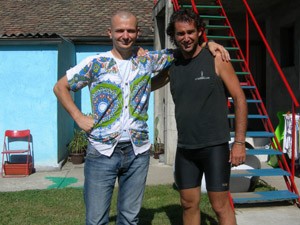
Slobodan is a 28 year-old guy from the interior of the country who studied graphic design in the capital city and who lives there for several years. “When I was younger I was punk, I used to cut myself with a knife before fighting to intimidate to the other ones”, he told me, when I asked him about his scars that he has in his arms. But Slobodan explained to me that now he is a more normal person who works in the Marketing area of a company and that he likes the cycling and the photography.
During my stay in the capital city, talking with Slobodan I understood a little more the history of the old Yugoslavia. According to him at the end of the Second World War, in1945, the country under control of the Communist Party of Yugoslavia was reunified, being Tito the Prime Minister. But progressively Tito was moving from the Stalinist official line, creating a new model. In this way, in 1963, he achieves through a new Constitution, the creation of the Socialist Federal Republic of Yugoslavia integrated by Slovenia, Croatia, Serbia, Bosnia-Herzegovina, Macedonia and Montenegro. During his government he defended reformations of the economic system directed to the market socialism, (the economic system in which the means of production are controlled by the workers in each company and the production is not planned centrally by the State, but guided through the market); for this Tito maintained a great prestige among a large number of the Yugoslavians, for his politics in favour of the peace and the union among the people of Yugoslavia, but he didn’t maintain it from the part of the relatives of Croatian and Bosnian anticommunist executed under his regime.
With the death of Tito in 1980 the ethnic divisions were revived, and finally everything exploded in the disintegration of the federation and a series of bloody Yugoslavian wars which took place during the decade of the 90. According to Slobodan people were very ignorant, because we allowed to be manipulated by the leaders of each ethnic group who only looked for the control of the power. “The media neither helped us”, he told me, “they scandalized everything and they scared us each time more saying to us that we could not leave from our houses and that there were Serbians, Croatians and Bosnian who were killing among themselves. So people kept killing each other because they understood that they had to do it, and many times among neighbor who had always cohabited together. Then everything escaped from our hands, the war had already begun”.
“But today, in spite of the fact that the war has concluded several years ago, a lot of people still have resentment. But I believe that it’s time to forget, because it is the only way of going ahead”, he told me.
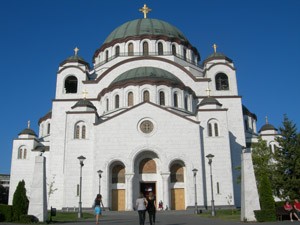
During my stay in the capital city, I visited the new Belgrade, where news and luxurious buildings begin to be built, located to the other side of the Sava River.
I also visited its beaches once more; the temple Hram Sv. Save, the second bigger orthodox church of the world and finally the walk area with its fine bars on the Danube coast. In the centre, I also noticed as people use to go to the parks, either to take some fresh air in front of its rivers or to spend the time playing to some table game.
The Kosovo war
Walking for the city I also see the remains of public buildings bombarded in the Kosovo war in 1999. Historically Kosovo has been considered the cradle of the Serbian people, although most of its population is from Albanian origin, for this reason, during the existence of Yugoslavia, Kosovo was always a province of the Serbian Republic. But in 1996 a civil war began between Albanian separatists and the Serbian forces and in 1999 the conflict became an international affair, and Belgrade was bombarded by the forces of the NATO which ordered to the Serbian forces to abandon the province of Kosovo. “But what is true”, Slobodan told me, “that although all the NATO members were involved in more or smaller grade, the United States was the dominant member of the alliance against Serbia”.
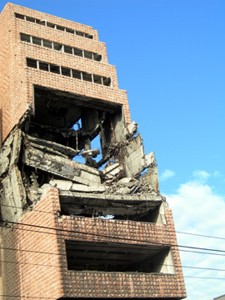
“The reason”, he told me in a furious tone, “that Kosovo proclaims its independence and that United States installs another huge base”. Today named the Bondsteel base, it will be in next decades, the logistical axis of the North American control of the transport of petroleum from the Caucasus and the Caspian Sea to the Mediterranean Sea; and also of the future corporate and military activities of the EE.UU. in the Persian Gulf.
According to Slobodan the Bondsteel base has 25 kilometres of roads and 300 buildings, where there are almost 7.000 North American soldiers. It is so big that the base is divided in three districts, where underground laboratories also exist to carry out the most diverse experiments. The base has commercial centres, a sport area with football fields and opened gyms the 24 hours, chapel, library and, according people say, one of the best equipped hospital of Europe. All these resources are exclusively to the North American soldiers and they are not part from any plan of humanitarian help to the Kosovo population who work to the multinational oil company Halliburton Oil and its filial Brown & Root Services earning between 1 and 3 dollars per hour, because according they say, they don’t want to inflate the local economy paying higher salaries.
“We, the Serbian people are sure that the Kosovo war was not a fair or humanitarian war in defence of the Albanians of Kosovo, but a new concealed colonialism by means of a false diplomacy “missionary” with corporate, military and overbearing interests of the North American foreign policy and its entire club. Because the true is that the construction of the Bondsteel camp had been planned long before of the 1999 war”, Slobodan told me.
Toward the south
I left Belgrade and I went toward the south skirting the Danube River, on my way to Bulgaria. And in spite of the constants ups and downs of the first day, the cycle was not difficult, although almost every day I had head wind which it didn’t allow me to go faster than 15 or 17 km per hour.
After 50 km from the capital city I cross Smederevo and suddenly I see the United States Steel, one of the most important steel companies of the world; so with some ignorance I wonder: “But aren’t they the same one who bombarded the capital city some years ago”? Truly that there are some things that I find difficult to understand them. But then I understood that for the Supreme Court of the United States an American corporation is entitled the same that a particular citizen. For this reason, with this legitimate verdict, the interests of their companies in any place of the world are always protected. Because of the human rights also camouflage the interests of those corporations which settle in the foreign lands to any price.
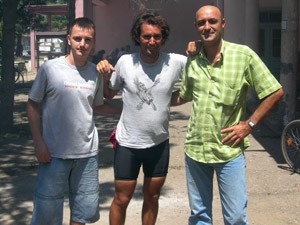
“We were ignorant”, Vladimir told me when on the road I stop to rest at noon. That day on my way to Lozobic, Vladimir comes to me and invites me with a sandwich and a juice.
Then he buys a snack and he gives it to me before I leave. Vladimir is veterinarian and his concern seems to be what is what the foreign people think about the Serbians. “We are not bad people” he said to me all time, “we were ignorant”. And I couldn’t believe it, because he said to me almost the same speech that I had heard by Slobodan. And I felt sad.
With the gypsies
It was in the same village that I knew Vladimir that I stopped to hear how some gypsies played music. According to people explained to me the Gypsy, Rom or Romani people is an ethnic group of which its origin is ignored, because they have not conserved their origin in writing, although it is believed that the roots of the gypsy people is in the northwest of India, border with Pakistan.
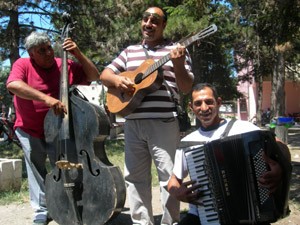
But for them the gypsy home takes place in their minds, it is more a mentality than a territory or state, it is a conviction and desire of being considered citizens of the world. Present in almost all the European states, in numerous American countries and in African and Asia, since the beginning, the gypsy people was related to the delinquency, to the occultism and the pagan arts, and to the vagrancy. These opinions were given by the non knowledge of other people, and the gypsies didn’t make a lot to deny them because of in certain way they protected them; because they were always a minority and nomadic people, in certain measure, consequence of the persecution and the marginalization. But also the gypsies since the beginning have been stood out for an important own contribution in the art and popular cultures, especially in the music. And truly that I felt pleasure when in that local bar I listened to them.
My trip kept going to the south, up to Nis, the second biggest city of the country. There I was received by some university students for a couple of nights and we shared very nice chats. And I didn’t surprise myself when they also expressed their great dislike to the foreign policy of the USA.
“In the old Yugoslavia the language always was the Serbo Croatian”, Vladan told me, but with the Yugoslavia dissolution each ethnic group began to change the language minutely with which we had always understood each other. It is incredible but today the Croatians say that they speak the Croatian, the Macedonians the Macedonian, the Bosnians the Bosnian and the Montenegrins the Montenegrin. And for this reason there is always some idiot that when you speak to him he said to you, sorry, I don’t understand you, can we speak English?”
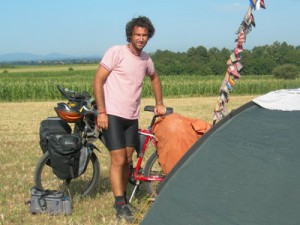
In the last 100 km toward the border with Bulgaria I cycled with tail wind, and almost all the way was flat, for this reason I took only some hours to cycle them. In the middle of the way I stopped in a petrol station, and while I went to the bathroom the dog who barked me took my packed lunch and ate it. When I realized it was late, so when I followed cycling I had to stop to buy food and then to cook me. That night, my last night in Serbia was cold and it rained, but at least I found a nice place to camp, covered by some trees from the strong wind and with a nice view to think about the country which I was leaving, and which doesn’t deserve to forget.


